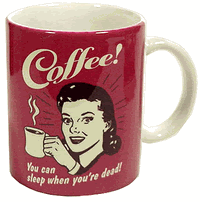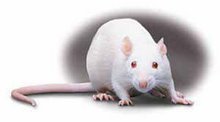I really hate it when the Big Talking Heads in upper management make snap decisions about projects. Inevitably it's me, or some other lab rat, who has to "make it happen", then we get screwed because the idea was half-assed, yet we are the ones tasked with making it work and get blamed if it doesn't. IF the idea actually works, guess who gets the credit. Not me.
I've seen several of these ideas in the years I've been at my current job. Here's how Big Talking Head Syndrome goes:
Step 1: The smooth-talking founder of a tiny startup biotech gets the ear of someone in upper management and convinces them that their niche product can cure cancer, regrow brain cells, make the blind see again, and bring world peace, all while making a million bucks a year for us.
Step 2: Upper Manager passes the buck to Business Manager, saying, "We've got a new break-through technology, and we're at the ground floor! Delegate it."
Step 3: Business Manager passes the buck to Middle Manager, saying, "I'm not sure what the business opportunity is here, but it must be good if The Boss says so. Do it."
Step 4: Middle manager passes the buck to Angry Lab Rat, saying, "I'm not sure what this technology is good for, but the business manager says Do It. So go make it happen."
Step 5: Angry Lab Rat says, "What the f*ck? Don't you realize we've got 50 other projects on our plate that are already behind schedule?"
Step 6: Middle Manager says, "Sorry, it came from the top. Try to squeeze it in. Oh, and it's top priority. Oh, and you still have to adhere to all your old deadlines for the other projects when they were deemed top priority. Come see me when you have results."
Of course, there's almost never any criteria for pass or fail for the new technology, no scope, no end date to the project, and no organized project plan. Big Talking Heads are apparently immune to the bureaucracy that hinders progress at my level. Eventually, almost all of these projects stretch on for months and months before they give up the ghost, unable to meet expectations. By then the folks at the top have gone on to chase other will-o'-wisps, while I still have a failed project on my record for my annual review. Those projects that actually "succeed" inevitably turn into a low-selling niche product that is discontinued after a few years.
I'm in the midst of one of those projects now. Some yahoos in a new biotech startup have invented a neat little technology. They got the ear of none other than the CEO of my evil global biotech company. The CEO passed it on to the business manager and my R&D director, who called a meeting with the yahoos. I was in that meeting. Admittedly it was a neat technology, and I did a quick analysis of it. After the meeting, I talked with the business manager. Though the technology was "neat", neither he nor I were able to see how the technology could in any way benefit our company. It wasn't the sort of thing we sold, and we couldn't think of a way it could be partnered with our products. Nonetheless, a couple weeks later, my middle manager and I were told by the director that I would be hosting the yahoos and training them how to use their own technology.
Yes, you read me right. They don't know how to use their own "amazing" technology, and I have to teach them. They've been getting suckers (like us) at various universities to do the analysis for them. So I've had to drop two days out of my exceedingly tight schedule to bring them to our site and show them how I do things. Unfortunately, I still have no clue how this is supposed to benefit us, or what, exactly, I'm supposed to be looking for. But when I raised the alarms with my manager, he shrugged and said, "Better do it, since it came from the CEO." This won't be the end of it, I'm certain.
I feel like I'm trying to play chess in the middle of a busy highway while someone at the top of a skyscraper a few blocks away broadcasts strategy tips to me with a megaphone.
The funny thing is that a year ago we instituted a whole new program management system, eliminating gobs of little projects like this one so we could focus on just a few, and requiring a great many hoops to jump through to get any new projects rolling, with complicated and lengthy business plans to justify it all. I can't tell you how many innovative ideas I and others have had that have lingered and died a slow death because lab rats like myself are too low on the totem pole to get through those hoops. Maybe some weren't good ideas, maybe some were "big hitters." We'll never know, since they never came up for debate or had time allocated for pilot experiments. And yet, like I said, Big Talking Heads are immune to this process.
Now, folks at the top are paid to see opportunities and move the company toward them. I can respect that. I can also respect how, at their level, they see more of the "big picture" than I do. But there's a right way and a wrong way to "make it happen." If, by chance, you are one of those Big Talking Heads, here's a word of advice: use Big Talking Head Syndrome only in rare cases which are sure to pay off, have a plan for its implementation, and communicate the plan down the ranks. Otherwise, just let me do my frickin' job.







